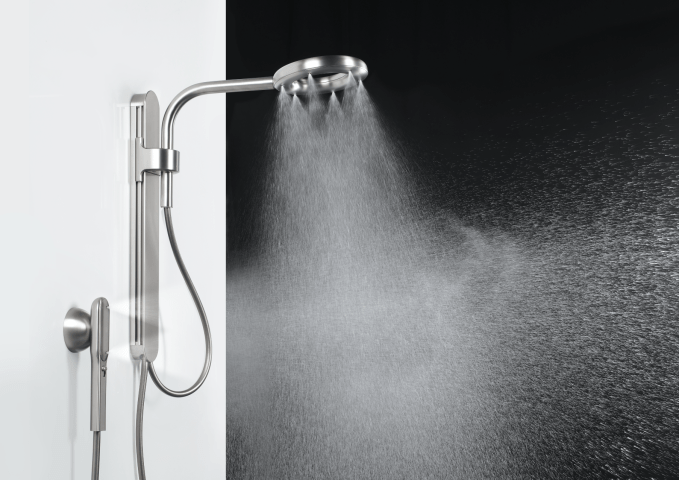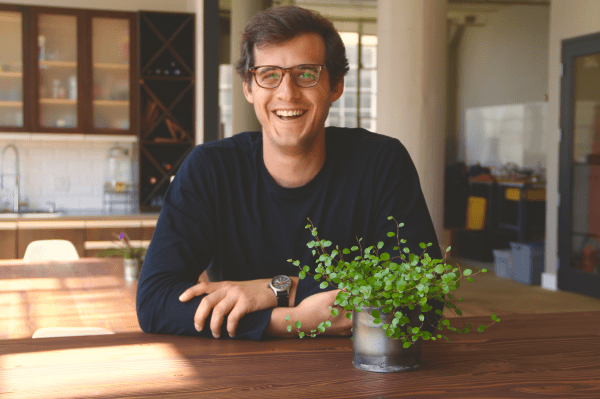Finding the right product/market fit is challenging for any company, but it’s just a little harder for hardware startups.
I recently visited the San Francisco offices of Nebia to chat with co-founder and CEO Philip Winter, whose eco-friendly hardware startup has received funding from Apple CEO Tim Cook, former Google CEO Eric Schmidt and Fitbit CEO James Park. After checking out the company’s latest shower head, we eased into a discussion about the opportunities and challenges facing hardware startups in Silicon Valley today.
TechCrunch: What’s so hard about hardware in 2020?
Philip Winter: The hardware landscape was, at one point, super-hot, at least in Silicon Valley. I would say like three or four years ago. A lot of companies came out with breakout products and a lot of them disappeared over the years since then. A lot of them are our peers — it’s a fairly small community.
What we’ve observed is that the cycles of iteration that you need to get to product/market fit in hardware are so much different than software. It’s just a lot less forgiving, and you don’t implicitly have an 80% margin like most software products or services do. At best, you have a 30% to 50% margin, and a lot more capital expenditure.
It seems like plenty of hardware startups die before they find that fit.
Getting product/market fit takes a while for any product and you just have to do a certain number of iterations and cycles. So, in addition to the fact that for hardware it’s harder to do these cycles and it’s longer, you also just need to survive long enough as a company to get there. With most products that have an idea and early traction, they can raise some money, there’s something there — it’s just a matter of refining it and in many ways, staying alive long enough to figure it out.
And so we’ve seen a lot of our peer companies raise like $20 to $50 million rounds and then you reach a point where, unless you have exit velocity and you’ve really started to scale revenues, investors say, “no mas,” and then you can lose your company almost overnight, because you can’t scale it back enough. You have too much infrastructure, too many people and so forth.
Something a lot of Silicon Valley companies are coming to terms with right now.
Exactly. So, we identified that a few years ago. We thought, we need a different approach, we’ve been really fortunate to get an awesome group of really patient investors. The problem that we’re addressing is important and meaningful enough that somebody needs to solve it and we want to be a part of that solution. So we need to organize ourselves in such a way that we can iterate through enough cycles to get to the right blend of product offering, price, margin to really be able to scale, and distribution. So that’s why we’ve kept the team kind of small over the last two or three years.

Nebia’s latest water-saving shower. Built in partnership with Moen.
Witnessing that investment uptick, there wasn’t any desire to just hire a dozen new engineers?
The crazy part was that the money was there to do it. And everything in startups is like “go fast, as fast as you possibly can.” It’s like, why wouldn’t you? But the problem is unless you just totally nail it, which is really hard to do on like your first shot, then it’s going to catch up with you. Even the really successful stories in hardware over the last 10 years in Silicon Valley, most successful being Fitbit or GoPro, they went public, but then they’ve had their own challenges, though they’ve had a meaningful impact on their industries.
I really think the thing is, you don’t have enough time, and the operating costs — especially in the Bay Area — are so expensive that you have to keep raising investor dollars.
At least, not right out of the gate. There are some really great companies that have been built over a 15 or 20-year horizon. Look at Dyson; they were making really simple things for a long time that got ever-more sophisticated, and now they’re an enormous corporation in their own right.
People love their $400 blow dryers, they must be doing well.
Yeah, obviously well! And I think that’s a bit of the same opportunity we have, because people will also buy a $400 vacuum. A vacuum is something you use, at best, once per week, but showers are this super important daily ritual and experience, but people have like $20 shower heads in their apartments and houses. I think we can build awareness around people owning their shower experience and customizing it exactly the way they want. And so that’s where we’re going.
So you really haven’t looked around and seen other startups growing their teams and been envious of that?
I’d be lying if I said no, so I’ll start with that. On the other hand, we’ve also been around long enough to see a lot of them come and go. And then we kind of tend to put our heads down and think, “what are the results telling us? Are customers liking the product more and more? Are we getting to a better price and cost? Are we understanding things better?” And it just kind of takes patience.
Having one of the industry’s most established — and one of the biggest — players in our space approach us and say, “we find what you’re doing really compelling for these reasons,” and then to get into the weeds and work on building a product together and have that go really well, we know we’re doing a lot of really important groundwork. And then we’re super-excited to now bring this back to Kickstarter, which is where we got our first shot, like, that’s what gave this company life.
Interesting you say that; I was just having a conversation with an editor about this. Do you think Kickstarter is still a good place to start a hardware company?
Totally, I mean that’s why we’re going back to it. I think it’s evolved a lot. It’s in a different moment than it was a handful of years ago in the maker community, because a lot of people have gotten burned. It is maturing as a platform and getting better at vetting projects. While still saying “Hey, this is a risk, that’s just the nature of it.”
Wrapping things up, as investors have grown attracted to new spaces like SaaS products, do you feel hardware investing has fallen out of style?
I think it has changed and probably for the better. There’s been a lot of money being thrown at ideas that don’t need as much money as they’re getting. Like maybe there are too many resources available and we’re starting to notice people becoming less scrupulous.
When, out of the gates, you raise $100 million; how could you possibly be using those resources effectively? You know, you just can’t. And then the bar for success becomes so far out there. And then you’re only successful if you’re a billion-dollar company. I think the overabundance of capital in Silicon Valley has hurt a lot of ideas and probably a lot of companies.
